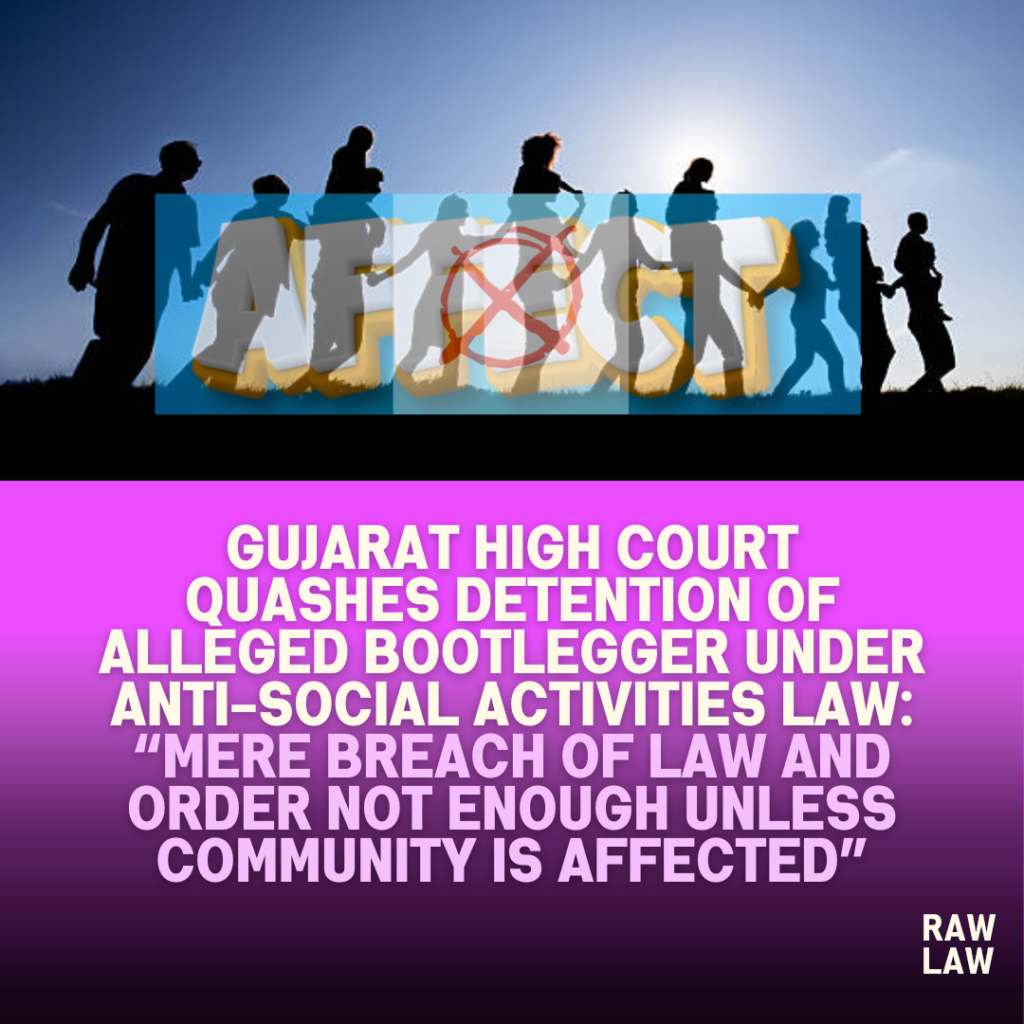Court’s Decision
The Gujarat High Court quashed a preventive detention order passed under the Gujarat Prevention of Anti-Social Activities Act, 1985 (PASA), against a person alleged to be a “bootlegger.” The Court held that the offences cited in support of the detention did not rise to the threshold of “public order” and thus, the detention was legally unsustainable.
“The material on record is not sufficient for holding that the alleged activities of the detenue have either affected adversely or are likely to affect adversely the maintenance of public order.”
The Court directed the immediate release of the detenue, if not required in any other case.
Facts
The petitioner was detained under an order dated 04.06.2025 issued by the District Magistrate, Bhavnagar, branding him as a bootlegger under Section 2(b) of the PASA Act. The detention was based on a prohibition case registered under Sections 65(A)(E), 116(B), 81, 83 and 98(2) of the Prohibition Act. The petitioner was already on bail in those offences. The authorities claimed that his actions affected public order, justifying his preventive detention.
The petitioner challenged the detention on the grounds that it lacked legal basis and did not satisfy the conditions prescribed under PASA for infringing personal liberty.
Issues
- Whether the petitioner’s activities qualified as a threat to “public order” under Section 3(4) of PASA?
- Whether criminal acts under the Prohibition Act alone justify preventive detention as a “bootlegger”?
- Whether the subjective satisfaction of the detaining authority was supported by relevant material?
Petitioner’s Arguments
The petitioner contended that the grounds of detention related solely to law and order and not public order. It was argued that the incidents mentioned in the detention order were isolated and had no impact on the public at large or the community. Therefore, invoking PASA violated the requirement of showing a real threat to public order. The petitioner emphasized that all cases were bailable and did not create any panic or terror among the public, a condition necessary to invoke preventive detention.
Respondent’s Arguments
The State argued that the petitioner was a habitual offender whose activities as a bootlegger had impacted society in Bhavnagar. It was contended that his repeated involvement in prohibition offences warranted preventive detention to preserve public order. The authorities relied on past criminal conduct to justify the subjective satisfaction reached by the District Magistrate.
Analysis of the Law
Section 3(4) of PASA distinguishes between “law and order” and “public order.” Preventive detention requires a higher threshold of threat—one that affects the public at large, not just isolated law-breaking. The Court noted that a detention order must be based on specific material showing that the acts disturb the even tempo of community life.
The Court emphasized that merely branding someone a bootlegger is not enough unless their activities adversely affect or are likely to affect public order.
Precedent Analysis
- Pushkar Mukherjee v. State of West Bengal, (1969) 1 SCC 10
The Court drew a clear distinction between “law and order” and “public order.” It held that personal disputes or individual infractions of law do not disturb public order unless they affect the community. - Piyush Kantilal Mehta v. Commissioner of Police, Ahmedabad, 1989 Supp (1) SCC 322
This case involved a similar detention based on prohibition offences. The Supreme Court held that unless the acts cause a sense of insecurity or panic among the public, detention is not justified under PASA.
Both cases were relied upon to underline that preventive detention must be grounded in clear, demonstrable threats to societal peace and not routine criminal allegations.
Court’s Reasoning
The High Court observed that the detaining authority had relied solely on prohibition cases without any evidence showing how the alleged acts disturbed public order. It held:
“The offences or the allegations cannot be said to have created any feeling of insecurity or panic or terror among the members of the public of the area in question giving rise to the question of maintenance of public order.”
The Court concluded that the subjective satisfaction reached by the detaining authority was based on insufficient material and, hence, was not legally valid.
Conclusion
The High Court allowed the petition and quashed the detention order dated 04.06.2025. It directed that the detenue be released forthwith if not required in any other case. The ruling reinforces that preventive detention is an exceptional measure that requires a demonstrable and serious threat to public peace.
Implications
- Preventive detention under PASA cannot be sustained on the basis of routine prohibition offences unless they affect the wider public.
- Authorities must distinguish between law and order issues and those genuinely affecting public order.
- Courts continue to uphold personal liberty unless its curtailment is justified by strong, legally tenable grounds.
Summary of Cases Referred
- Pushkar Mukherjee v. State of West Bengal
Laid the foundational distinction between “law and order” and “public order.” Preventive detention must target public disorder, not personal disputes. - Piyush Kantilal Mehta v. Commissioner of Police, Ahmedabad
Held that preventive detention based on prohibition cases without public impact is invalid. Applied directly to assess the current detention order.
FAQs
Q1. Can a person be detained preventively under PASA for prohibition-related offences?
Only if such offences create a threat to public order. Mere registration of prohibition cases is insufficient unless the acts cause fear or insecurity in the community.
Q2. What is the difference between law and order and public order under PASA?
Law and order pertains to individual criminal acts. Public order requires a broader impact, disturbing the peace and security of the general public.
Q3. Why did the Court quash the detention order in this case?
Because the activities cited did not meet the standard for disturbing public order. The petitioner’s acts were isolated and lacked any wider social impact.
